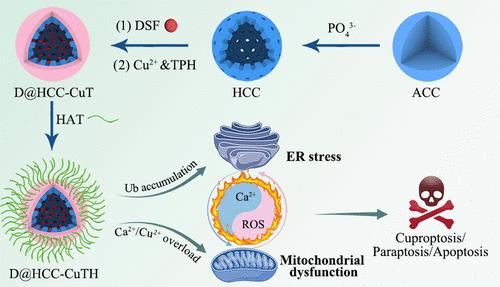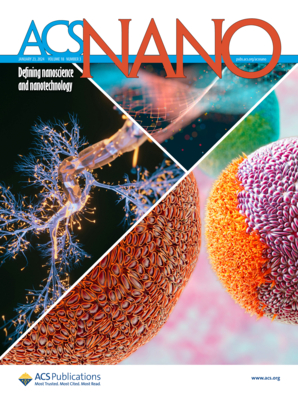Hollow Calcium/Copper Bimetallic Amplifier for Cuproptosis/Paraptosis/Apoptosis Cancer Therapy via Cascade Reinforcement of Endoplasmic Reticulum Stress and Mitochondrial Dysfunction
IF 15.8
1区 材料科学
Q1 CHEMISTRY, MULTIDISCIPLINARY
引用次数: 0
Abstract
The endoplasmic reticulum (ER) and mitochondria are essential organelles that play crucial roles in maintaining cellular homeostasis. The simultaneous induction of ER stress and mitochondrial dysfunction represents a promising yet challenging strategy for cancer treatment. Herein, a hollow calcium–copper bimetallic nanoplatform is developed as a cascade amplifier to reinforce ER stress and mitochondrial dysfunction for breast cancer treatment. For this purpose, we report a facile method for preparing hollow CaCO3 (HCC) nanoparticles by regulating the dissolution–recrystallization process of amorphous CaCO3, and the amplifier D@HCC-CuTH is meticulously fabricated by sequentially coating disulfiram-loaded HCC nanoparticles with a copper coordination polymer and hyaluronan. In tumor cells, the dithiocarbamate–copper complex generated in situ by liberated disulfiram and Cu2+ inhibits the ubiquitin–proteasome system, causing irreversible ER stress and intracellular Ca2+ redistribution. Meanwhile, the amplifier induces mitochondrial dysfunction via triggering a self-amplifying loop of mitochondrial Ca2+ burst, and reactive oxygen species augment. Additionally, Cu2+ induces dihydrolipoamide S-acetyltransferase oligomerization in mitochondria, further exacerbating mitochondrial damage via cuproptosis. Collectively, ER stress amplification and mitochondrial dysfunction synergistically induce a cuproptosis–paraptosis–apoptosis trimodal cell death pathway, which demonstrates significant efficacy in suppressing tumor growth. This study presents a paradigm for synchronously inducing subcellular organelle disorders to boost cancer multimodal therapy.

通过内质网应激和线粒体功能障碍的级联强化,用于杯突/钝化/凋亡癌症疗法的中空钙/铜双金属放大器
内质网(ER)和线粒体是维持细胞平衡的重要细胞器。同时诱导内质网应激和线粒体功能障碍是一种前景广阔但极具挑战性的癌症治疗策略。在此,我们开发了一种中空的钙铜双金属纳米平台,作为一种级联放大器来强化ER应激和线粒体功能障碍,从而治疗乳腺癌。为此,我们报告了一种通过调节无定形 CaCO3 的溶解-重结晶过程来制备中空 CaCO3(HCC)纳米颗粒的简便方法,并通过将铜配位聚合物和透明质酸依次包覆在双硫仑负载的 HCC 纳米颗粒上,精心制作了放大器 D@HCC-CuTH。在肿瘤细胞中,双硫仑和 Cu2+ 在原位生成的二硫代氨基甲酸铜复合物会抑制泛素-蛋白酶体系统,造成不可逆的 ER 压力和细胞内 Ca2+ 重新分布。同时,放大器通过触发线粒体 Ca2+ 暴发的自我放大循环,诱发线粒体功能障碍,活性氧增加。此外,Cu2+ 还会诱导线粒体中的二氢脂酰胺 S-乙酰转移酶寡聚化,通过杯突作用进一步加剧线粒体损伤。总之,ER 应激放大和线粒体功能障碍会协同诱导杯突-凋亡-细胞凋亡三模式细胞死亡途径,从而在抑制肿瘤生长方面发挥显著功效。这项研究提出了一种同步诱导亚细胞器紊乱以促进癌症多模式治疗的范例。
本文章由计算机程序翻译,如有差异,请以英文原文为准。
求助全文
约1分钟内获得全文
求助全文
来源期刊

ACS Nano
工程技术-材料科学:综合
CiteScore
26.00
自引率
4.10%
发文量
1627
审稿时长
1.7 months
期刊介绍:
ACS Nano, published monthly, serves as an international forum for comprehensive articles on nanoscience and nanotechnology research at the intersections of chemistry, biology, materials science, physics, and engineering. The journal fosters communication among scientists in these communities, facilitating collaboration, new research opportunities, and advancements through discoveries. ACS Nano covers synthesis, assembly, characterization, theory, and simulation of nanostructures, nanobiotechnology, nanofabrication, methods and tools for nanoscience and nanotechnology, and self- and directed-assembly. Alongside original research articles, it offers thorough reviews, perspectives on cutting-edge research, and discussions envisioning the future of nanoscience and nanotechnology.
 求助内容:
求助内容: 应助结果提醒方式:
应助结果提醒方式:


